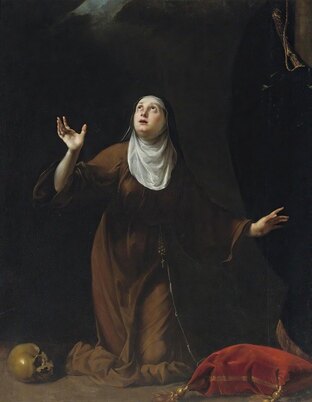|
Arcangela Tarabotti was born in 1604 in Castello, a neighborhood of Venice, to Maria Cadena and Stefano Tarabotti. She had four sisters and two brothers. Like her father, Tarabotti was born lame. Her condition made her unsuitable for marriage in her father’s eyes and at the age of eleven, she was sent to the Benedictine Convent of Sant’Anna. At sixteen, Tarabotti took her first vows of poverty, chastity, obedience, and stability. She took her final vows in 1623. Tarabotti describes herself as an autodidact and criticizes the inadequate education available to her during her time in the convent. Despite never receiving a sufficient education, Tarabotti produced seven works, five of which were published during her lifetime. Tarabotti died in 1652 at the age of forty-eight in Sant'Anna.
Tarabotti’s earliest works, the Inferno Monacale and the Tirannia Paterna, address forced monachization: the practice of placing women, who do not have religious callings, into convents. In these works, Tarabotti critiques parents who use convents to rid themselves of their unmarried daughters. Despite her best efforts, including sending copies to France, neither of these provocative texts were published in Tarabotti’s lifetime. Her first published text, Paradiso Monacale (1643), recognizes the benefit of nunneries for young women with genuine religious vocations. This more conventional work established Tarabotti as a writer and expanded her literary circle throughout Venice. Tarabotti’s Lettere Familiari e di Complimento (1650), showcases her strong relationships with various important men and women throughout Italy and France such as Ambassador Henri Bretel de Grémonville, Vittoria della Rovere of Florence, Cardinal Mazarin of France, and members of the Incogniti in Venice. Still, Tarabotti faced public scrutiny for her bold critiques of the Venetian patriarchy and her responses to various anti-women texts. In the next few weeks, I will be looking at passages from one of her first works, Tirannia Paterna, published posthumously in 1654. I will explore Tarabotti’s critiques of the Venetian patriarchy, her appeal to figures like Dante, and her explication of the biblical grounding for the excellence of women as she highlights the abuse parents subject their daughters to when they force them into prison-like convents. --MP Image Info: A Nun Saint. Simone Pignoni. Italy, 1611-1698. Source: https://artvee.com/dl/a-nun-saint/
0 Comments
Leave a Reply. |
Authors
Jacinta Shrimpton is a PhD student in Philosophy at the University of Sydney. She is co-producer of the ENN New Voices podcast Archives
May 2024
Categories
All
|

 RSS Feed
RSS Feed